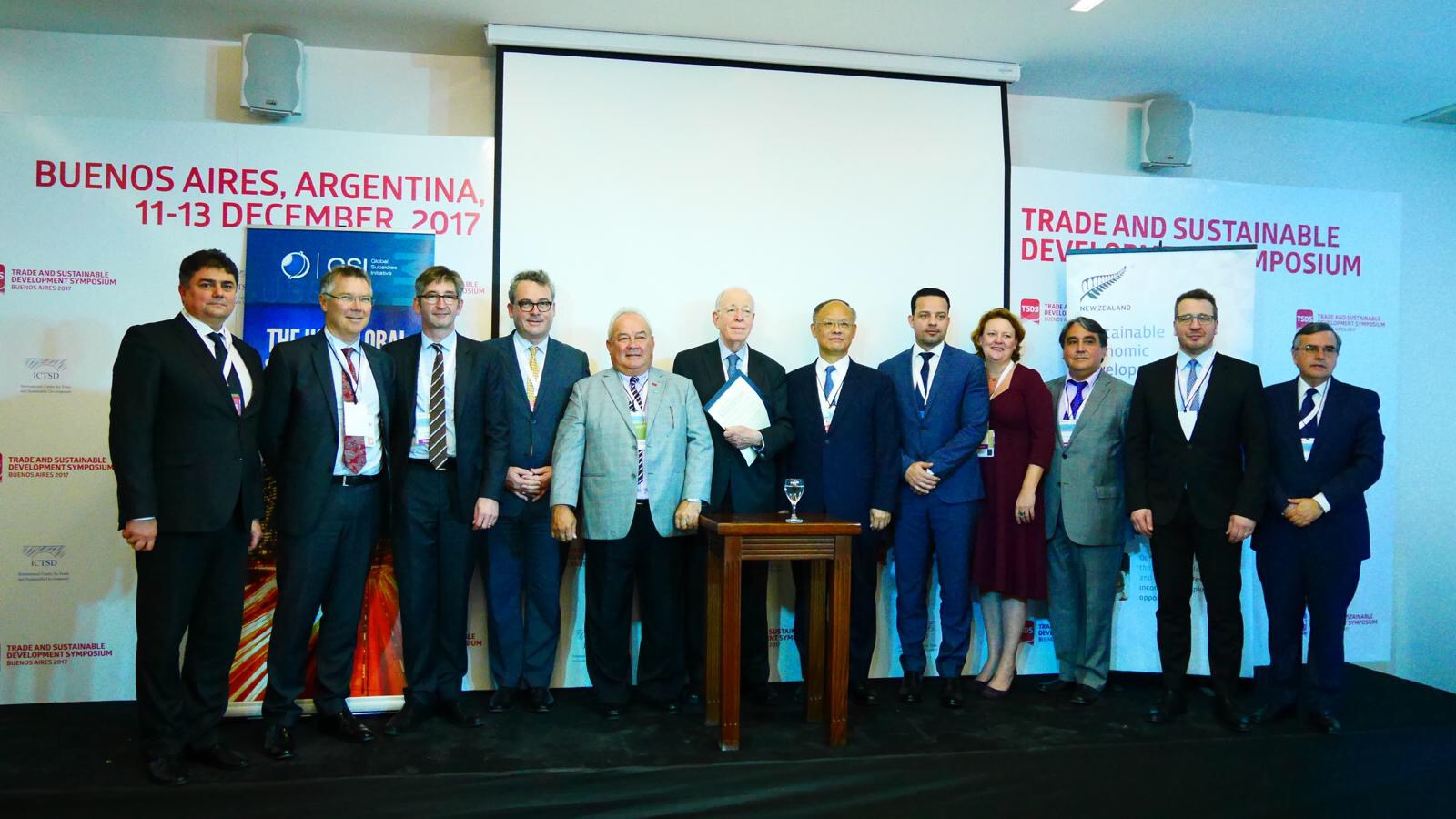
For the first time ever, the reform of fossil fuel subsides (FFS) was officially brought into the World Trade Organization (WTO) with the Ministerial Statement WT/MIN(17)/54 presented at the WTO’s Eleventh Ministerial Conference (MC11) in Buenos Aires on December 11 2017.
The statement, presented by a group of 12 WTO Members, called on the WTO to “achieve ambitious and effective disciplines on inefficient fossil fuel subsidies that encourage wasteful consumption including through enhanced WTO transparency and reporting that will enable the evaluation of the trade and resource effects of fossil fuel subsidies programmes.” The endorsing members were Chile; Costa Rica; Iceland; Liechtenstein; Mexico; The Republic of Moldova; New Zealand; Norway; Samoa; Switzerland; The Separate Customs Territory of Taiwan, Penghu, Kinmen and Matsu; and Uruguay.
The Ministerial Statement was presented at an event by the Friends of Fossil Fuel Subsidy Reform, which was attended by a considerable number of ministers and high-level officials and addressed the linkages between FFS and trade. The event included interventions from Kai Mykkänen, Minister of Trade and Development from Finland; Vangelis Vitalis, Deputy Secretary Trade and Economic from New Zealand; Jean Baptiste Lemoyne, French State Secretary at Ministry of Foreign Affairs; Oscar Stenström, Swedish State Secretary to the Minister of EU Affairs and Trade; Alvaro Cedeño Molinari, Costa Rica Ambassador to the WTO in Geneva; Peter Wooders, Director of the Energy Program at IISD; and David Laborde, Senior Research Fellow at IFPRI. The panel was moderated by Soledad Aguilar, Director of Climate Change at the Argentinian Ministry of Environment and Sustainable Development.
The presentation of the Ministerial Statement also included words from David Parker, New Zealand’s Minister for Trade and Export Growth; Hon. Lautafi Purcell, Samoa’s Minister for Public Enterprises; John Fonseca, Costa Rica’s Vice-Minister of Foreign Trade; Ambassador Markus Schlagenhof from Switzerland; and WTO Deputy Director General Alan Wolff. Delegations from the endorsing economies took part in the presentation.
Why should the WTO consider FFS?
FFS encourage wasteful consumption, aggravate local pollution, contribute to climate change, disadvantage clean energy technologies and drain scarce public resources that could be better directed to other sustainable development goals. As Ambassador Cedeño from Costa Rica indicated in the panel: by subsidizing fossil fuels, “we are subsidizing the [climate change] crisis.”
In addition to the negative environmental and economic effects of FFS, by lowering the price of the production and consumption of fossil fuels, FFS distort global markets, create illicit trade flows and affect technology transfer, which are classic trade issues.
Deputy Secretary Vitalis from New Zealand discussed three main reasons of why the WTO can play a very important role in addressing FFS:
- First, the Preamble that established the WTO in 1995 recognized the need for “the optimal use of the world’s resources in accordance with the objective of sustainable development.”
- Second, FFS have transboundary effects, affecting environment and development globally and impacting trade flows.
- Third, because the WTO is “the one place where we have enforceable disciplines” that apply to all of its members and that can lead to meaningful reform.
What would it mean for trade and development?
All the panelists agreed that trade and the WTO have important roles in FFS reform and insisted that trade should not be considered a disabler of sustainable development. On the contrary, “it is possible to have growth and CO2 emissions reductions at the same time,” as Secretary Stenström indicated, pointing to the successful Swedish example. Sweden demonstrated that social and economic development is possible with a combination of trade, FFS reform and innovation, as well as the engagement of the local communities.
New Zealand Trade Minister David Parker said that “phasing out fossil fuel subsidies will offer huge opportunities for promotion of sustainable development, renewable energy, removal of trade distortions and the reduction of global warming.”
And what is next?
The presentation of the Ministerial Statement was a very important first step to address FFS at the WTO, and opened the need to think further on how to use WTO’s existing mechanisms. Research shows some opportunities that range from promoting technical assistance and capacity building to including FFS in the Agreement on Subsidies and Countervailing Measures as prohibited subsidies.
Furthermore, bilateral and plurilateral trade agreements are important tools to address FFS reform. Economies can push concrete articles and demands in trade agreements, as Minister Mykkänen emphasized. In the same line, Secretary Lemoyne reminded of the French initiative at the European Union proposing to support multilateral efforts in the discussion of disciplines related to FFS in trade. The initiative was part of the broader Action Plan launched on October 25 to support the Comprehensive Economic and Trade Agreement between Canada and the European Union from an environmental perspective.
Which way to follow depends on several factors. Peter Wooders (IISD) indicated: “We need more complete data but also debate as to what constitutes a producer subsidy, taking into account countries’ legitimate concerns on competitiveness.” Regarding subsidies to the consumption, he added: “speeding up consumer subsidy reform is more a question of WTO playing a role in a wider, more mature debate and support structure.”